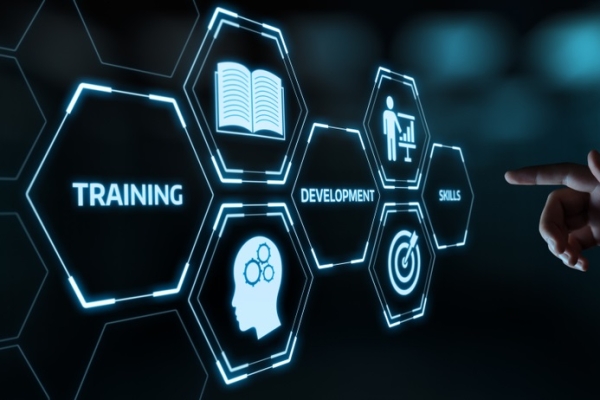The role of talent practitioners has become increasingly difficult as they need to create strategies for a rapidly changing today and an unpredictable tomorrow.
As the world emerges from the pandemic with renewed hope, businesses worldwide are trying to adapt to the new and changing reality. COVID-19 has been a huge catalyst in changing the way we work and do business. Never before was the HR/talent role so strategic and key to business survival.
The role of talent practitioners has become increasingly difficult as they need to create strategies for a rapidly changing today and an unpredictable tomorrow. During the pandemic, talent professionals rose to the occasion, and the key role was to maintain business continuity. As we move past the pandemic, building relevant, adaptable, and future-ready talent strategies is imperative for organisations.
Here are five key talent trends to pay attention to as you design, create, and execute talent management strategies for your organisation.
1. Hybrid/remote work: Hybrid work models that leverage a blend of remote and in-person work are here to stay. Increased technology usage will reduce physical footprint, create jobs across boundaries, and drive inclusion.
2. Skill scarcity: Upskilling will be a significant differentiator.
3. Continued human and tech co-evolution: The need for both tech and human skills will continue to grow, and the ability to make these skills work together will be key. Every company will be a technology company in some way.
4. The age of disruption: The future of business will be unpredictable. New companies and industries will disrupt the business space in a short span of time.
5. Leaders will have to lead with a more human touch in a tech environment: Empathy, communication, and personalisation will be key leadership traits.
Here are three broad imperatives organisations must keep in mind while designing their Talent Management initiatives:
1. Greater Personalisation
Go digital/utilise as much tech as possible: Remote work models have forced organisations to go the ‘tech way’. Most organisations that I have consulted recently are opting for digital platforms to serve personalised Talent Management needs, usually a mobile app with multiple functionalities like:
• Assessments (behavioural/functional)
- Bite-sized learning
- Feedback/reviews
- Employee engagement
• One size doesn’t fit all: Talent initiatives like learning and development, career paths, and so on should be personalised and should work for an individual or at least a small set of individuals. Examples:
- Anywhere/anytime learning
- Career paths suited to skill sets
- Workloads that match an individual’s remote working needs
2. Future Focused
• The outcome is most important: Talent Management strategies should be developed with the end outcome kept in mind. The delta movement should be measurable.
• “What’s in it for me” should be clearly communicated. Employees should see talent initiatives not as an organisational mandate but as how they can develop and move the needle. They should be able to see the benefit for themselves as individuals. This becomes even more important as we see Gen Z join the workforce.
• All Talent Management initiatives should be created with the future kept in mind. In the last year, while consulting for 3 leading banks in our country and helping them create Competency Frameworks to enable business growth, the top competencies defined (in varying measures) are:
- Agility
- Digital mindset
- Learnability
- Communication (with empathy in a digital environment)
These Competency Frameworks have been created with business imperatives for banks in the near future kept in mind and designed to remain relevant for at least a few years.
3. Experiential with Short Timeline
• Make talent initiatives more experiential: As the future of work becomes unpredictable, instead of having a classroom session on building a certain skill or behaviour, people should be engaged in simulations to learn the skill or behaviour. Immersion in the experience will ensure long-lasting learning.
• Should not be too long/less focus time: All the learning initiatives should be time-bound and not too long, as the business cycles themselves have become short. An Action Learning Project that used to be 6–9 months long a few years back should be designed to get completed in, say, three months today.
Finally, one needs to keep in mind that Talent Management strategies are a means to an end. Business imperatives are the most important, and the talent strategy needs to serve the business.

Are you comfortable working with dispersed colleagues?
Trending
-
SBI General Insurance Launches Digital Health Campaign
-
CredR Rolls Out 'Life Happens' Leave For Its Employees
-
Meesho Announces 30-Week Gender-Neutral Parental Leave Policy
-
Microsoft Unveils Tech Resilience Curriculum To Foster An Inclusive Future
-
60% Indian Professionals Looking For Job Change Due To COVID: Survey
-
SpringPeople And Siemens Collaborate For Digital Transformation Push
-
86% Professionals Believe Hybrid Work Is Essential For Work Life Balance: Report
-
Almost 1 In Every 3 People's Personal Life Affected Due To Work Stress
-
Meesho Rolls Out Reset And Recharge Policy For Employees
-
80% Of Talent Leaders & Academics Say Pandemic Changed Skill Needs For Youth: Report
-
Hero Electric Rolls Out 'Hero Care' Program For Employees
-
Human Capital In Collaboration With ASSOCHAM Hosts Virtual Conference
-
IKEA India, Tata STRIVE Collaborate To Create Employability And Entrepreneurship Opportunities
-
SAP India, Microsoft Launch Tech Skilling Program for Young Women
-
DXC Technology, NASSCOM Collaborate For Employability Skills Program
-
Lenskart To Hire Over 2000 Employees Across India By 2022
-
Mindtree Launches Learn-and-Earn Program
-
Tata AIA Extends 'Raksha Ka Teeka' To Its Employees
-
Swadesh Behera Is The New CPO Of Titan
-
NetConnect Global Plans To Recruit 5000 Tech Professionals In India
-
Hubhopper Plans To Hire 60% Of Indian Podcasters By 2022
-
Corporate India Needs More Women In Leadership Roles: Report
-
Aon to Invest $30 Million and Create 10,000 Apprenticeships by 2030
-
Tech Mahindra Launches ‘Gift a Career’ Initiative for Upskilling of Youth
-
40% Women Prefer Flexible Working Options in Post-COVID World: Survey
-
3 out of 4 companies believe they can effectively hire employees virtually: Report
-
Vodafone , CGI and NASSCOM Foundation launch digital skills platform
-
Odisha: Bank, postal employees to deliver cash for elderly, differently-abled persons
-
Skill India launches AI-based digital platform for "Skilled Workforce"
-
Hiring activity declines 6.73% in first quarter: Survey
-
70% startups impacted by COVID-19 pandemic
-
Bajaj Allianz Life ropes in Santanu Banerjee as CHRO
-
Over 70 Percent MSMEs look at cutting jobs to sustain businesses
-
93 Per Cent employees stressed about returning to office post-lockdown
-
Johnson & Johnson India announces family benefits for same gender partners
-
Indian firms turning friendly towards working mothers
-
Welspun India names Rajendra Mehta as new CHRO
-
Wipro partners with NASSCOM to launch Future Skills platform



Human Capital is niche media organisation for HR and Corporate. Our aim is to create an outstanding user experience for all our clients, readers, employers and employees through inspiring, industry-leading content pieces in the form of case studies, analysis, expert reports, authored articles and blogs. We cover topics such as talent acquisition, learning and development, diversity and inclusion, leadership, compensation, recruitment and many more.
Subscribe Now












































Comment